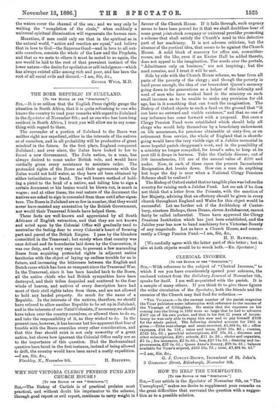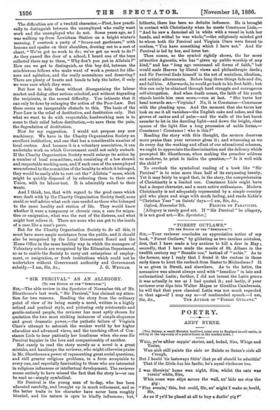HOW TO HELP THE UNEMPLOYED.
[To xins EDITO1 or TILE "SrscruTos."] Sia,—Your article in the Spectator of November eth, on "The Unemployed," makes me desire to supplement your remarks on the great difficulties that surround the question with a sugges- tion as to a possible solution.
The difficulties are of a twofold character,—First, how practi- cally to distinguish between the unemployed who really want work and the unemployed who do not. Some years ago, as I was walking up from Lewisham Station on a bright winter's morning, I overtook a party of "frozen-out gardeners," with brooms and spades on their shoulders, droning out to a sort of chant, "We've got no work to do; we've got no work to do !" As they passed the door of a school, I heard one of the boys collected there say to them, "Why don't you put in Alleluia P" How can we get to distinguish, as this boy did, between the mischievous fellows who make want of work a pretext for idle- ness and agitation, and the really necessitous and deserving ? There are plenty of hearts and hands to help the latter, if only we were sure which they were.
But how to help them without disorganising the labour market and doing other serious mischief, and without degrading the recipients, is the second difficulty. You intimate that it can only be done by enlarging the action of the Poor-Law. But there seems an insuperable obstacle to this. The basis of the Poor-Law is the relief of destitution, and destitution only. But what we want to do with respectable, hardworking men is to come to their relief before destitution,—to save them the pain, the degradation of destitution.
Now for my suggestion. I would not propose any new machinery. We have in the Charity Organisation Society an excellent institution, and one that has a considerable number of local centres. And because it is a voluntary association, it can undertake work on which Government could not safely embark. If the Charity Organisation Society would enlarge its action by a number of local committees, each consisting of a few shrewd and respectable working men, and if each case of the unemployed were referred to the committee of the locality to which it belonged, they would be easily able to sort out the " Alleluia" cases, which might be quickly disposed of by referring them to their own Union, with its labour-test. It is admirably suited to their wants.
And I think, too, that with regard to the good cases which were dealt with by the Charity Organisation Society itself, none could so well advise what each case needed as those who belonged to the same locality and station of life. They would know whether it were a temporary or chronic case, a case for migra- tion or emigration, what was the root of the distress, and what might best relieve it. There are none who can get to the inside of a case like a man's peers.
But for the Charity Organisation Society to do all this, it must have more ample assistance from the public, and it should also be recognised by the Local Government Board and the Home Office in the same healthy way in which the managers of Voluntary schools are recognised by the Education Department, so as to enable the Society to carry out enterprises of employ- ment, or emigration, or fresh institutions which could not be undertaken without Government authority and Government



































 Previous page
Previous page